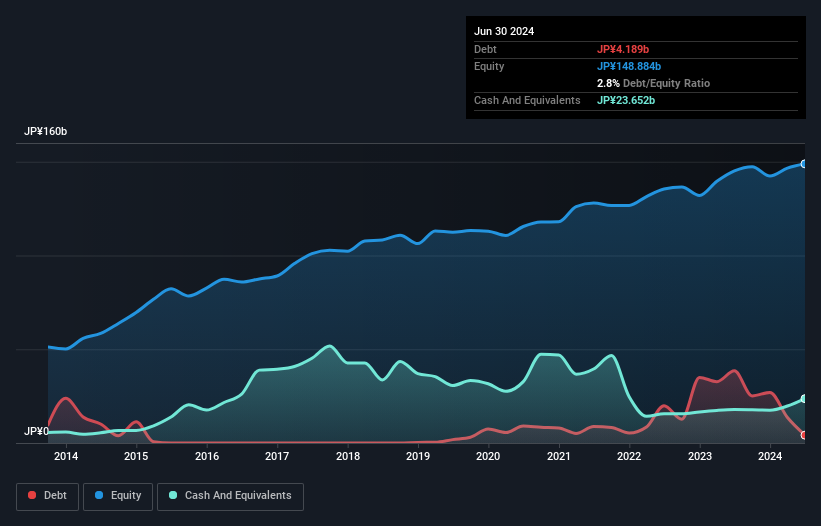
Howard Marks put it nicely when he said that, rather than worrying about share price volatility, 'The possibility of permanent loss is the risk I worry about... and every practical investor I know worries about.' So it seems the smart money knows that debt - which is usually involved in bankruptcies - is a very important factor, when you assess how risky a company is. As with many other companies Fujitsu General Limited (TSE:6755) makes use of debt. But should shareholders be worried about its use of debt?
What Risk Does Debt Bring?
Debt is a tool to help businesses grow, but if a business is incapable of paying off its lenders, then it exists at their mercy. In the worst case scenario, a company can go bankrupt if it cannot pay its creditors. However, a more usual (but still expensive) situation is where a company must dilute shareholders at a cheap share price simply to get debt under control. By replacing dilution, though, debt can be an extremely good tool for businesses that need capital to invest in growth at high rates of return. When we think about a company's use of debt, we first look at cash and debt together.
See our latest analysis for Fujitsu General
How Much Debt Does Fujitsu General Carry?
As you can see below, Fujitsu General had JP¥4.19b of debt at June 2024, down from JP¥38.5b a year prior. However, its balance sheet shows it holds JP¥23.7b in cash, so it actually has JP¥19.5b net cash.

How Healthy Is Fujitsu General's Balance Sheet?
Zooming in on the latest balance sheet data, we can see that Fujitsu General had liabilities of JP¥100.3b due within 12 months and liabilities of JP¥17.9b due beyond that. Offsetting these obligations, it had cash of JP¥23.7b as well as receivables valued at JP¥77.5b due within 12 months. So its liabilities total JP¥17.1b more than the combination of its cash and short-term receivables.
Since publicly traded Fujitsu General shares are worth a total of JP¥212.4b, it seems unlikely that this level of liabilities would be a major threat. But there are sufficient liabilities that we would certainly recommend shareholders continue to monitor the balance sheet, going forward. While it does have liabilities worth noting, Fujitsu General also has more cash than debt, so we're pretty confident it can manage its debt safely.
The modesty of its debt load may become crucial for Fujitsu General if management cannot prevent a repeat of the 44% cut to EBIT over the last year. When a company sees its earnings tank, it can sometimes find its relationships with its lenders turn sour. The balance sheet is clearly the area to focus on when you are analysing debt. But ultimately the future profitability of the business will decide if Fujitsu General can strengthen its balance sheet over time. So if you want to see what the professionals think, you might find this free report on analyst profit forecasts to be interesting.
Finally, while the tax-man may adore accounting profits, lenders only accept cold hard cash. Fujitsu General may have net cash on the balance sheet, but it is still interesting to look at how well the business converts its earnings before interest and tax (EBIT) to free cash flow, because that will influence both its need for, and its capacity to manage debt. Looking at the most recent three years, Fujitsu General recorded free cash flow of 27% of its EBIT, which is weaker than we'd expect. That's not great, when it comes to paying down debt.
Summing Up
While it is always sensible to look at a company's total liabilities, it is very reassuring that Fujitsu General has JP¥19.5b in net cash. So we don't have any problem with Fujitsu General's use of debt. When analysing debt levels, the balance sheet is the obvious place to start. But ultimately, every company can contain risks that exist outside of the balance sheet. Case in point: We've spotted 3 warning signs for Fujitsu General you should be aware of.
If you're interested in investing in businesses that can grow profits without the burden of debt, then check out this free list of growing businesses that have net cash on the balance sheet.
New: AI Stock Screener & Alerts
Our new AI Stock Screener scans the market every day to uncover opportunities.
• Dividend Powerhouses (3%+ Yield)
• Undervalued Small Caps with Insider Buying
• High growth Tech and AI Companies
Or build your own from over 50 metrics.
Have feedback on this article? Concerned about the content? Get in touch with us directly. Alternatively, email editorial-team (at) simplywallst.com.
This article by Simply Wall St is general in nature. We provide commentary based on historical data and analyst forecasts only using an unbiased methodology and our articles are not intended to be financial advice. It does not constitute a recommendation to buy or sell any stock, and does not take account of your objectives, or your financial situation. We aim to bring you long-term focused analysis driven by fundamental data. Note that our analysis may not factor in the latest price-sensitive company announcements or qualitative material. Simply Wall St has no position in any stocks mentioned.
About TSE:6755
Fujitsu General
Develops, manufactures, sells, and service of air conditioner and telecommunications products and components.
Excellent balance sheet with moderate growth potential.
Market Insights
Community Narratives



